热词翻译:“推动国际关系民主化”英文怎么说?
“推动国际关系民主化”英文怎么说?
根据热词译领导讲话翻译数据库,在《把握共同命运 共创美好未来》的翻译中,“推动国际关系民主化”被翻译为:
推动国际关系民主化
promote greater democracy in international relations
promote greater democracy in international relations
例句如下:
我们要建设公道正义的未来。各国无论大小、强弱,都是国际社会平等一员。国际上的事情要由各国商量着办。要推动平等有序的世界多极化,维护以联合国为核心的国际体系、以国际法为基础的国际秩序、以联合国宪章宗旨和原则为基础的国际关系基本准则。要强化国际法治权威,抵制恃强凌弱的丛林法则,反对单边制裁等霸权行径,维护发展中国家正当权益,推动国际关系民主化,捍卫国际公平正义。
Countries of the world need to build a future of fairness and justice. All countries, regardless of their size and strength, are equal members of the international community. International affairs should be handled through consultation by all countries. We need to build an equal and orderly multipolar world, and defend the U.N.-centered international system, the international order based on international law, and the basic norms of international relations underpinned by the purposes and principles of the U.N. Charter. We need to strengthen the authority of international rule of law, reject the law of the jungle where the strong bully the weak, oppose acts of hegemonism such as unilateral sanctions, protect the legitimate rights and interests of developing countries, promote greater democracy in international relations, and uphold international fairness and justice.
Countries of the world need to build a future of fairness and justice. All countries, regardless of their size and strength, are equal members of the international community. International affairs should be handled through consultation by all countries. We need to build an equal and orderly multipolar world, and defend the U.N.-centered international system, the international order based on international law, and the basic norms of international relations underpinned by the purposes and principles of the U.N. Charter. We need to strengthen the authority of international rule of law, reject the law of the jungle where the strong bully the weak, oppose acts of hegemonism such as unilateral sanctions, protect the legitimate rights and interests of developing countries, promote greater democracy in international relations, and uphold international fairness and justice.
热词链接
“推动国际关系民主化”在其他来源中的翻译:
1 《2025年4月30日外交部发言人郭嘉昆主持例行记者会》中“推动国际关系民主化”的翻译
国际社会看到,以金砖国家为代表的全球南方日益成为推动国际关系民主化的进步力量、正义力量。一个团结合作、联合自强的全球南方必将为世界注入更多稳定性和确定性。
The international community sees that the Global South, represented by BRICS, has gradually become a force for progress and justice that advances greater democracy in international relations. A Global South that features solidarity and cooperation and seeks strength through unity will surely bring more stability and certainty to the world.
The international community sees that the Global South, represented by BRICS, has gradually become a force for progress and justice that advances greater democracy in international relations. A Global South that features solidarity and cooperation and seeks strength through unity will surely bring more stability and certainty to the world.
2 《2024年9月13日外交部发言人毛宁主持例行记者会》中“推动国际关系民主化”的翻译
王毅主任高度评价金砖合作积极、稳定、向善的作用,表示金砖国家日益成为维护世界和平、促进共同发展、完善全球治理、推动国际关系民主化的建设性力量。去年,金砖迈出扩员历史性步伐,充分展现金砖机制的强大生命力和感召力。要充分发挥“大金砖”的战略意义和政治效应,坚持独立自主、团结协作、共同发展,维护发展中国家正当权益,拓展新兴市场国家发展空间,在全球治理体系中发出更加明确一致的金砖之声。
Director Wang Yi spoke highly of the role of BRICS as a positive and stable force for good in international affairs. He said that BRICS countries have increasingly become a constructive force in maintaining world peace, promoting common development, improving global governance, and advancing democracy in international relations. BRICS took a historic step of expansion last year, fully demonstrating the strong vitality and appeal of the BRICS mechanism. It is important to fully leverage the strategic significance and political effects of greater BRICS, uphold independence, solidarity, collaboration and common development, protect the legitimate rights and interests of developing countries, and expand the development space for emerging markets, so as to send out a clearer and more consistent voice of BRICS countries in the global governance system.
Director Wang Yi spoke highly of the role of BRICS as a positive and stable force for good in international affairs. He said that BRICS countries have increasingly become a constructive force in maintaining world peace, promoting common development, improving global governance, and advancing democracy in international relations. BRICS took a historic step of expansion last year, fully demonstrating the strong vitality and appeal of the BRICS mechanism. It is important to fully leverage the strategic significance and political effects of greater BRICS, uphold independence, solidarity, collaboration and common development, protect the legitimate rights and interests of developing countries, and expand the development space for emerging markets, so as to send out a clearer and more consistent voice of BRICS countries in the global governance system.
3 《从和平共处到命运与共的历史跨越》中“推动国际关系民主化”的翻译
构建人类命运共同体理念为建立公正合理的国际秩序探索正确路径,实现向共商共建共享全球治理的历史跨越。习近平总书记指出,这一理念着眼世界多极化和经济全球化的历史大势,丰富了发展和安全的新实践。世界命运应该由各国共同掌握,国际规则应该由各国共同书写,全球事务应该由各国共同治理,发展成果应该由各国共同分享。构建人类命运共同体理念倡导共商共建共享的全球治理观,践行真正的多边主义,坚定维护联合国权威和地位,坚决反对一切形式的霸权主义和强权政治。倡导平等有序的世界多极化,推动国际关系民主化,主张确保各国都能在多极体系中找到自己的位置,都能在遵守国际法前提下发挥应有的作用,确保世界多极化进程总体稳定和具有建设性。倡导普惠包容的经济全球化,推动实现增长机遇的普惠、发展道路的包容,妥善解决国家间和各国内部的发展失衡问题,实现各国尤其是发展中国家共同繁荣、共同富裕。
The Vision of Building a Community with a Shared Future for Mankind explores a right way for building a just and equitable international order, and is a historical step forward toward conducting global governance featuring extensive consultation and joint contribution for shared benefit. As pointed out by General Secretary Xi Jinping, the Vision keeps pace with the historic trend toward multipolarity and economic globalization, and inspires new ways to achieve development and security. The destiny of the world should be kept in the hands of all countries, international rules should be written by all countries, global affairs should be governed by all countries, and the fruits of development should be shared by all countries. The Vision advocates global governance featuring extensive consultation and joint contribution for shared benefit. It practices true multilateralism, firmly upholds the authority and standing of the U.N., and resolutely opposes all forms of hegemony and power politics. The Vision advocates an equal and orderly multipolar world, and promotes greater democracy in international relations. It aims to ensure that countries find their place in the multipolar system and play their role under the premise of observing international law, and that the process of world multipolarity is generally stable and constructive. The Vision advocates a universally beneficial and inclusive economic globalization, and encourages sharing of growth opportunities, accommodation of development paths, and proper solutions to global and regional imbalances, with a view to achieving common prosperity and development of all countries, especially developing countries.
The Vision of Building a Community with a Shared Future for Mankind explores a right way for building a just and equitable international order, and is a historical step forward toward conducting global governance featuring extensive consultation and joint contribution for shared benefit. As pointed out by General Secretary Xi Jinping, the Vision keeps pace with the historic trend toward multipolarity and economic globalization, and inspires new ways to achieve development and security. The destiny of the world should be kept in the hands of all countries, international rules should be written by all countries, global affairs should be governed by all countries, and the fruits of development should be shared by all countries. The Vision advocates global governance featuring extensive consultation and joint contribution for shared benefit. It practices true multilateralism, firmly upholds the authority and standing of the U.N., and resolutely opposes all forms of hegemony and power politics. The Vision advocates an equal and orderly multipolar world, and promotes greater democracy in international relations. It aims to ensure that countries find their place in the multipolar system and play their role under the premise of observing international law, and that the process of world multipolarity is generally stable and constructive. The Vision advocates a universally beneficial and inclusive economic globalization, and encourages sharing of growth opportunities, accommodation of development paths, and proper solutions to global and regional imbalances, with a view to achieving common prosperity and development of all countries, especially developing countries.

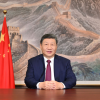 国家主席习近平发表二〇二六年新年贺词
国家主席习近平发表二〇二六年新年贺词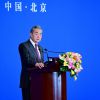 在历史演进重大关头开拓中国特色大国外交新境界
在历史演进重大关头开拓中国特色大国外交新境界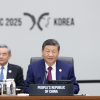 习近平在亚太经合组织第三十二次领导人非正式会议第一阶段会议上的讲话
习近平在亚太经合组织第三十二次领导人非正式会议第一阶段会议上的讲话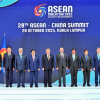 李强在第28次中国—东盟领导人会议上的讲话
李强在第28次中国—东盟领导人会议上的讲话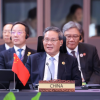 李强在第20届东亚峰会上的讲话
李强在第20届东亚峰会上的讲话